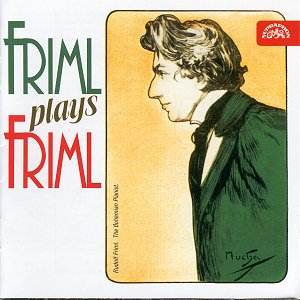Friml had an active and varied career. A pupil of Dvořák
at fourteen at the Prague Conservatoire he was employed by the National
Theatre as a vocal coach at the outrageous age of eighteen. He also
accompanied his contemporary, the violinist Jan Kubelik, a fellow student,
for nine years until 1906 when Friml emigrated to America and
began the career for which he is best remembered, as an operetta composer
of the highest distinction. Nearly sixty years after he first settled
in America Friml returned to the city of his birth to give a gala concert
at Lucerna Hall and to record this album of melodies and improvisations
for Supraphon. As a pendant his Op 1, Zavis’s Songs, was recorded, the
tenor being that stalwart of the Supraphon operatic catalogue, Ivo Zidek.
The tenor’s tactful but honest recollections are included in the booklet
and he notes that when confronted by his first opus the now 85 year
old composer grew "a little fidgety" and during their preliminary
rehearsal more or less improvised his way through the piano part. Though
he had tightened up for the recording it seems only to have been the
skill of the recording engineers in particular that managed to smooth
the session, Zidek himself singling out Franta Burda for particular
praise. One suspects multiple takes, considerable lengths of tape, scissors
and a lot of sellotape went into the production of the finished article.
The elderly composer played with brio and sometimes
panache but it’s idle to pretend that his technique had emerged as miraculously
unscathed as had that of, say, Saint-Saens many years earlier. Friml’s
pianism teems with wrong notes, can be splashy and inaccurate and often
rhythmically somewhat stilted – but, despite all this, never remotely
enough to impede enjoyment or pleasure at the sound of the composer
revisiting his youthful triumphs with such affectionate engagement.
He is, for example, sprightfully lively in the melodies from Rose
Marie, apparently impervious to the lorry load of spilled notes
trailing in his wake. He can no longer send a glistening treble run
up the scale but he can convey much of the easy charm and lyrical largesse
of his music – such avuncular insouciance. In Allah’s Holiday,
the cod Easternisms are dispatched with rude roulades of brio, whereas
the Straussisms of The Firefly, one of his most famous melodies,
are visited by furtive rubatos and a deliciously syncopated middle section,
flashy and conclusive. The Improvisations were a good medium
for Friml, especially in the light of his failing memory, giving rein
to his flair for a good tune, unconstrained by too much formality of
structure and graced by his lyric ease. The Prague Improvisation is
affectionate – a little arthritic rhythmically perhaps - and full of
wrong notes, left and right hand, but with its jaunty central section
it is an appropriate approximation of a rather cosmopolitan Slavonic
Dance. Who cares if it’s so splashy when the feeling is so right?
Zidek and Friml did eventual justice to those Op 1
Songs with their ardour and simplicity. The second of the cycle of five,
For You, is deliciously expressive whilst the last quotes Dvořák,
Friml’s teacher, an act of homage that brings the little cycle, pliant,
ardent, delicate, to an affectionate conclusion. Zidek himself sings
with his accustomed and sovereign command – consonants glistening, strong
but sensitively shaped lines – and is an admirable exponent of
Friml’s brand of youthful innocence.
First released in 1965, the CD is graced by a Mucha
portrait from the first decade of the century, and is a delightful and
charming souvenir of one of the Czech lands’ most successful exports.
Jonathan Woolf
